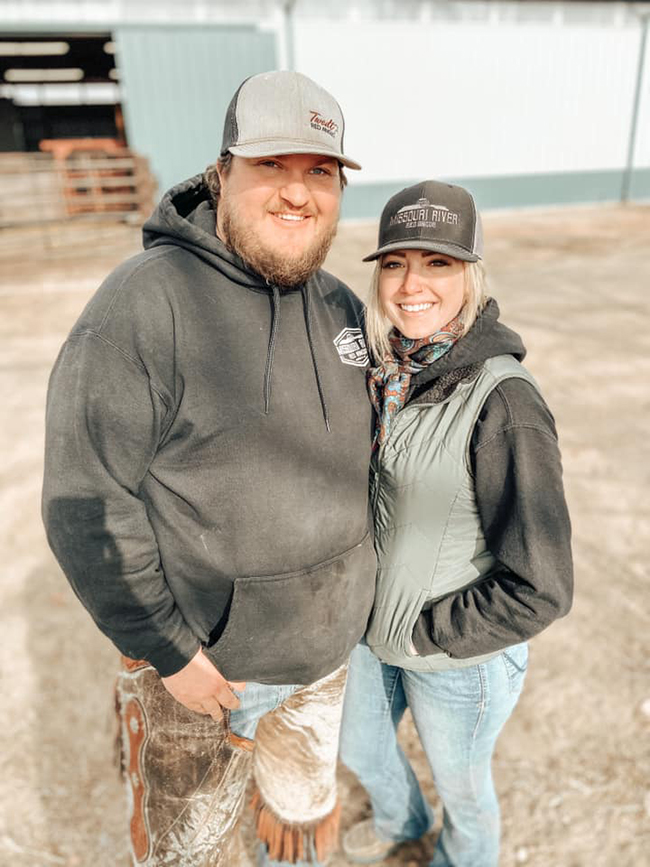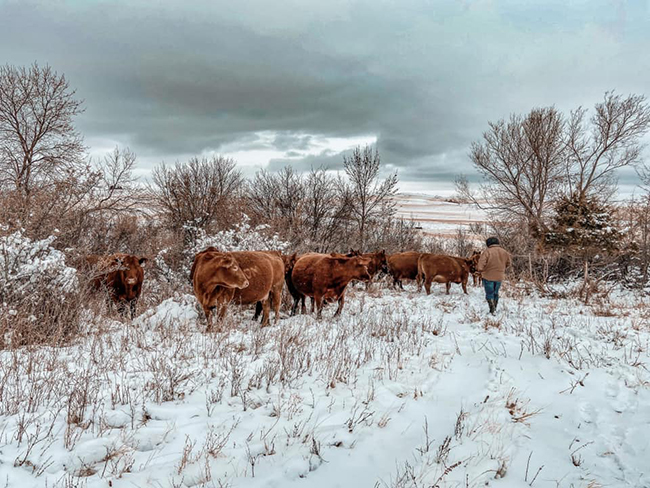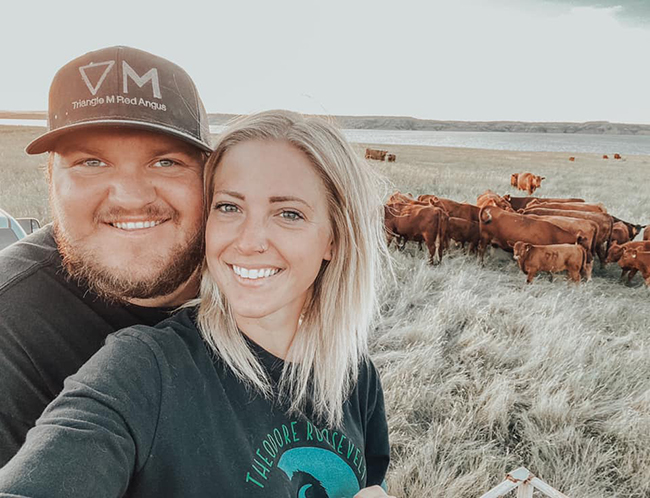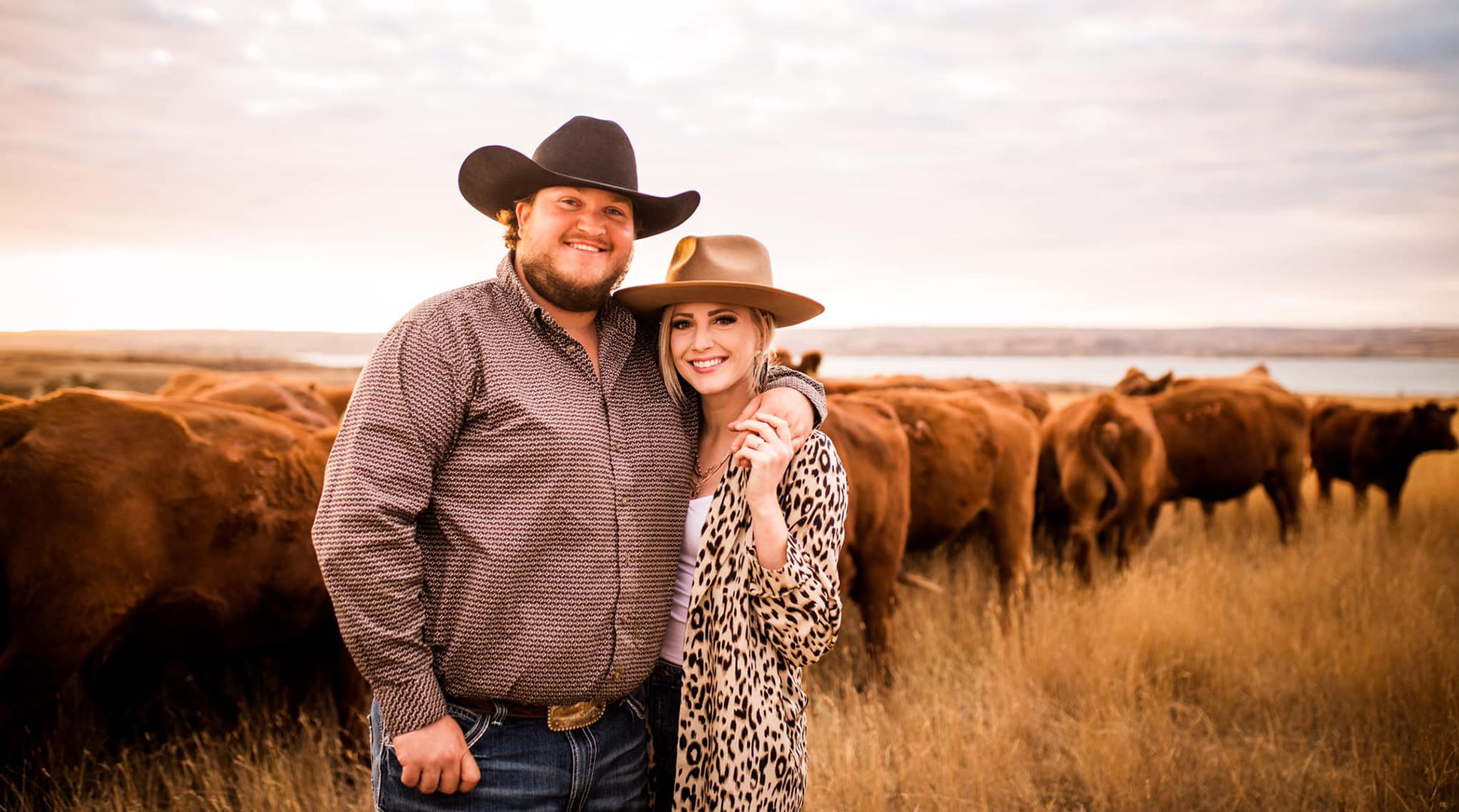by Whitney Wold
Tell us about your farm/ranch. What you raise, how long you have been farming/ranching, your family:
My husband Blake and I are a fourth generation ranch with a commercial red angus cow calf operation focused on females. We develop high-quality replacement heifers from our own herd, as well as purchased heifers to breed and sell as bred heifers in the fall and early winter. In 2017, we had the opportunity to purchase our first set of registered cows and have since grown that herd and moved into seedstock production. Each year, we host our annual bull sale the first Wednesday in April at the Sidney Livestock Market in Sidney, Montana. We run our registered and commercial herds north of Watford City, along the Missouri River. We are known as “Missouri River Red Angus,” because we wanted to integrate this amazing natural resource for our cattle into our name.
My husband and I grew up quite differently. While Blake was born into farming and ranching, I was not. Although I didn’t have that farming and ranching background, I did grow up in a rural, small town in the southwest corner of North Dakota--so I did understand the integral role agriculture played within the community. When I married Blake, I was delighted to get to officially experience agriculture in a “hands on” manner. I dove in head first, learning the ropes and how things worked and fell in love with it instantly.

Blake is currently full-time out at the ranch, while I am an elementary teacher in town. Together, we have been able to integrate our own knowledge and skillsets to promote and educate others about the farming and ranching industry.
Why do you ranch? What motivates you to keep doing it?
It is a way of life that is just so humbling. We get to strive for, advocate, and promote something we believe in. When we succeed, it’s because of all of the work that WE put in. People want to be the best they can possibly be at what they do, and in agriculture, you get to reap the fruits of your own labor.
Even when you think you’ve mastered something, you get the opportunity to figure out a way to do it better, more efficiently. It’s a challenging way of life, but you are in control of how you do things, how things run, and the decisions being made. It’s rewarding knowing that in some way, you are helping sustain life.
What are your biggest struggles as rancher?
Honestly, this is such a tough question to answer. I truly feel like mental health and the lack of human connection and interaction is one of the most difficult things about being a farmer or rancher. Most of the day, my husband is working by himself, whether fencing, working cattle, preparing for sales, whatever it may be. Ranching and farming are such lonely careers. Keeping ahead of our mental health and making sure that we are making the time to interact with others and pull ourselves away from that isolation can be difficult, but it’s truly so important in making sure we are taking care of ourselves.
Additionally, I think that the amount of time that you have to put into farming and ranching is tough. Everything that isn’t an immediate need or activity has to be pushed back in order to make sure your ranch or farm is running smoothly and to its full potential. There are so many times Blake and I have to change our plans and rework our schedules in order to take care of something that takes precedence over what we had planned. Although it can be difficult to juggle our daily lives and take time “off” for activities and vacations like other people our age take, we truly wouldn’t have it any other way. Do we wish we could do more things away from the ranch? Sure. But knowing we are providing food for consumers, raising cattle others can use within their herds, and advocating for the industry makes it all worthwhile.
Do you think farmers and ranchers are inherently different than other people?
I do think farmers and ranchers are inherently different than other people. Not having grown up in agriculture, I really had to jump in with Blake as my guide as we worked through the lifestyle together. I can distinctly remember thinking to myself, “My gosh, Blake would do anything it takes for these animals.”
Fencing in 100+ degree weather, calving in 4 feet of snow, working cattle in frigid temperatures – I couldn’t believe the perseverance and the drive he had. As I stated earlier, farming and ranching isn’t an “easy” career. It’s tough work, long hours, never-ending tasks, and underappreciation.

Farmers and ranchers are providing us with the food and resources we use to feed and clothe our families, and consumers don’t often realize that these people are working day in and day out and being pulled away from their own families, all to provide for others. Honestly, farmers and ranchers have to be some of the most selfless people on this planet.
What did you want to be when you grew up? How does farming/ranching fit into that dream?
Growing up, I had always been excited about the possibility of becoming an educator. I loved the idea of being able to work with people and open their minds to new ideas, strategies, and experiences. I’m currently a fifth-grade teacher in Watford City and have been teaching for 8 years. Just recently, I joined NDFB’s Promotion and Education Committee, using my knowledge as an educator to create a bridge between education and agriculture.
In my own classroom, I have already started educating students about topics such as the role beef plays in a healthy diet and sharing common misconceptions about the topic. I do provide both viewpoints, allowing students to engage in discussions where both viewpoints are valued, but any misconceptions around beef and the beef community are corrected appropriately. It’s been such a fun and positive experience and the kids love it!
I’ve also taken the initiative to complete the Masters of Beef Advocacy course through the Beef Learning Center. This course has allowed me to speak more knowledgably to consumers about all of the positive aspects of agriculture and advocate for the farming and ranching community. I’m hopeful to continue to sharing my knowledge and experiences as a rancher in hopes that educating and advocating can change the way others view agriculture.
If you could say one thing to consumers about agriculture, what would it be?
It would be that farmers and ranchers are doing their very best to be good stewards of the land. They are trying to do everything they possibly can to help feed the world with the resources they are given. I feel as though so many people have misconceptions about farmers and ranchers and the effect they have on land and the environment, when in reality, so many of them are protecting millions of acres of grasslands and are using land that is not suitable for crop production. Ranchers take the grass from land that’s not suitable for crops and turn that grass into a healthy, protein source that we can feed to consumers and their families. What could be more amazing than that?!

Whitney is the District 8 representative on the NDFB Promotion and Education Committee.
